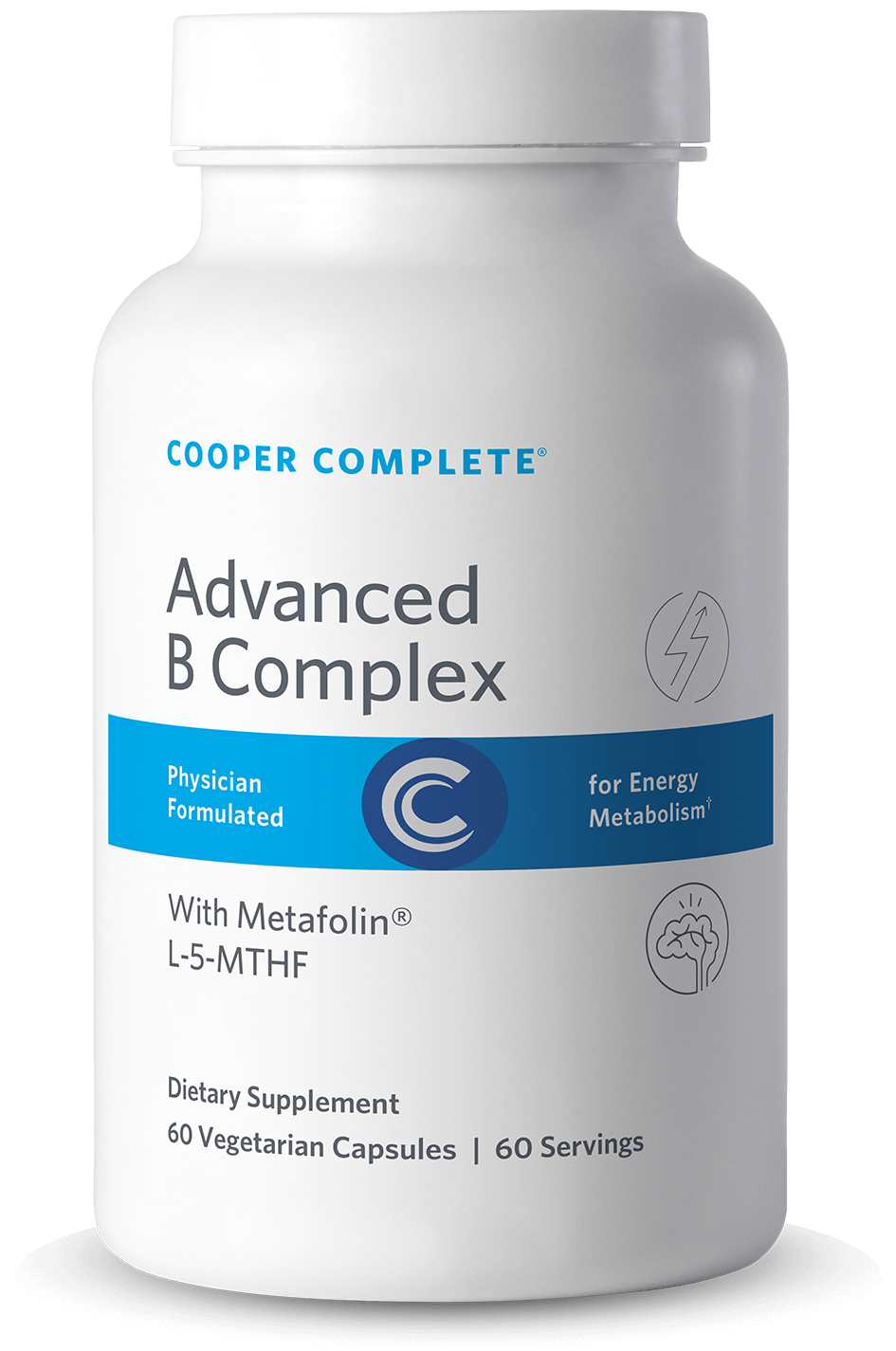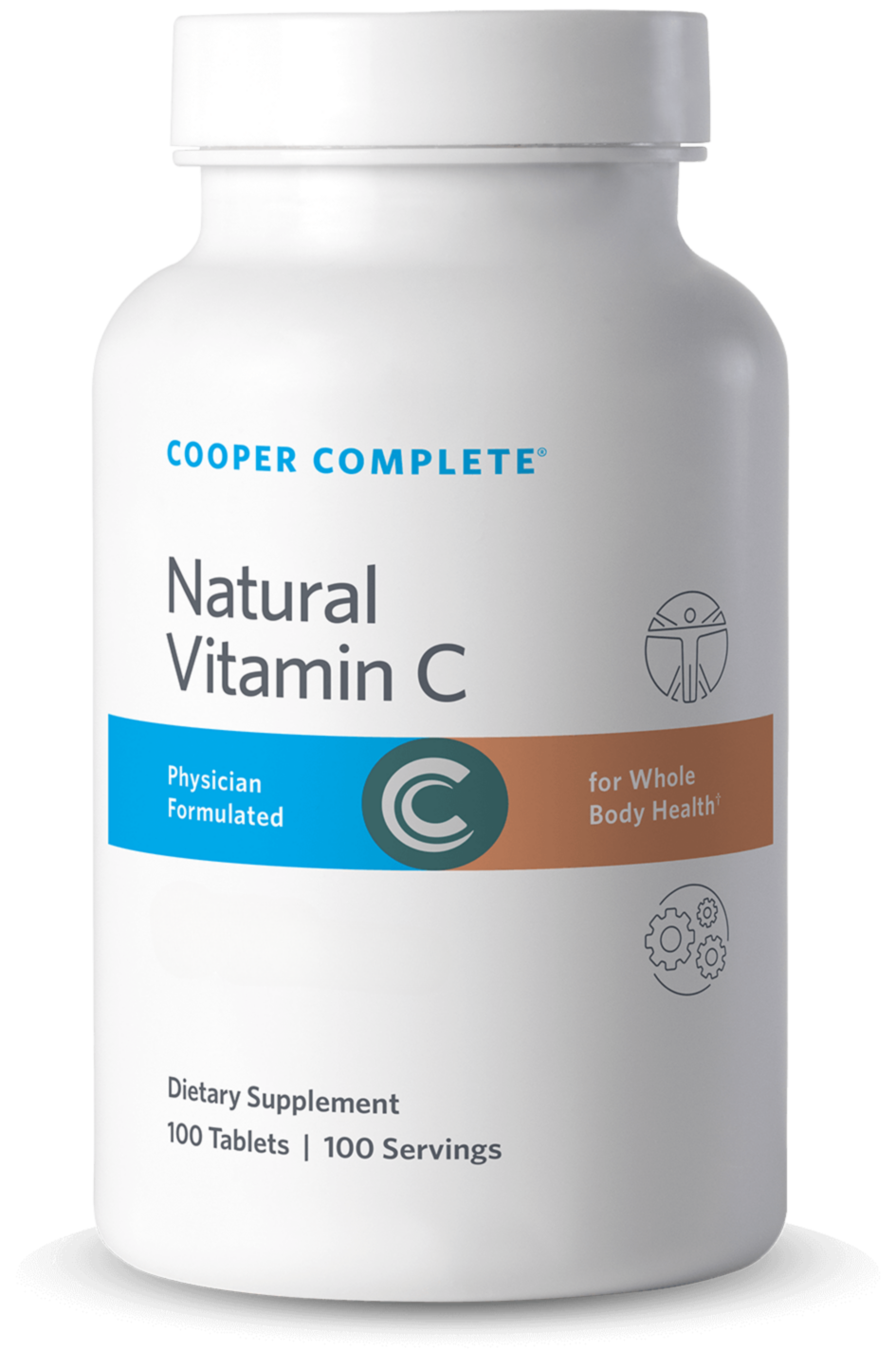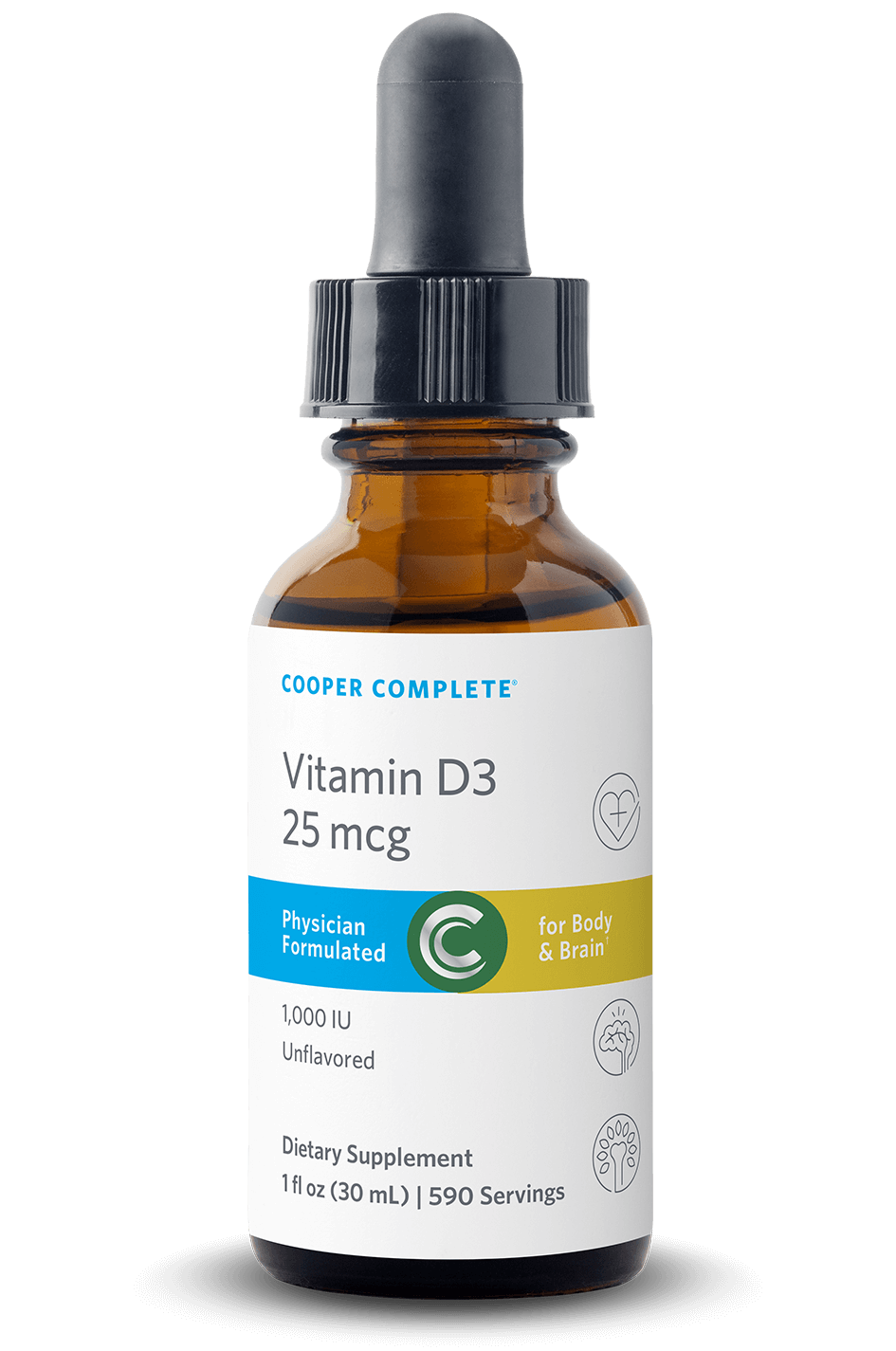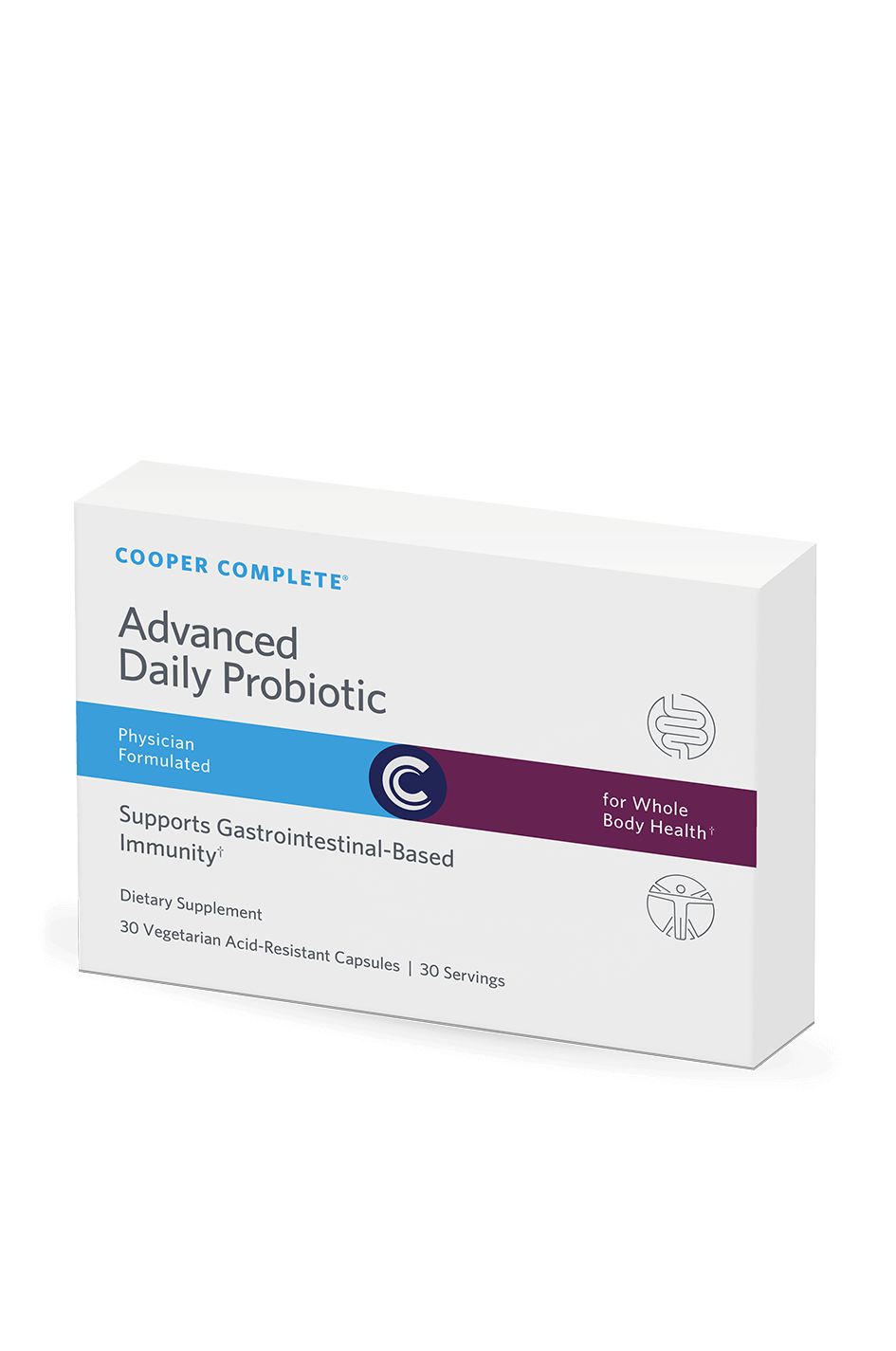Supplements for General Health

Even if you try to eat right, you still may not get all the nutrients your body needs, especially as you age. For example, fewer than 10 percent of us get the minimum required amounts of vitamins D and E in our diets. This is just one of the reasons you might need supplements in your diet. But what vitamins and supplements do you need? The variety of vitamins on the market can make it overwhelming to determine which you should take. This article provides an overview of the supplements for general health—and the specific vitamins they feature—you might consider.

Advanced B Complex Supplement
Advanced Vitamin B Complex supplement contains the activated, methylated, most easily absorbable forms of eight essential B vitamins, including biotin and folate, to support cellular energy production and immune, cardiovascular, and neurological health.†
$23.68 Add to cartMultivitamins and B Complex Supplements
A multivitamin can provide us with the nutrients we need when our diets fall short of meeting the recommended minimums. A 2019 CDC study showed only 12.3% of the U.S. population had sufficient fruit intake and only 10.1 percent had sufficient vegetable intake. Other studies have demonstrated that the produce we eat today contains lower levels of essential vitamins and minerals than the produce we consumed decades ago, likely due to soil depletion. An essential supplement for general health, multivitamins are good options for filling any nutritional dietary gaps and typically provides most or all the B vitamins, vitamins C and D plus minerals magnesium and zinc for immune health.
B vitamins, often referred to as B-complex vitamins, are water-soluble and not produced nor stored in the body but must be replenished daily, making them a key component of daily multivitamin supplements for general health. The eight specific B vitamins convert the food we eat into energy, which the body uses to support liver and brain function and promote optimal heart health and healthy skin.
Vitamin B1 (Thiamin) – Energy Metabolism
Also known as thiamin, vitamin B1 is an essential nutrient that helps the body convert food into fuel for the brain, nerves and heart, and is essential for processing carbohydrates. Thiamin deficiency can cause weight loss, muscle weakness, short-term memory loss and other mental symptoms. Because thiamin is stored in very small amounts in the liver and has a relatively short half-life, bodies require a consistent supply. Fortified breakfast cereal and bread are the most common sources of thiamine, with small amounts also found in fish, pork and beans. People most likely to have thiamin deficiency are older adults or people who have diabetes, have undergone weight loss surgery, or have alcohol dependence.
Vitamin B2 (Riboflavin) – Cell Function and Energy Production
Often used to prevent migraine headaches and treat muscle cramps, vitamin B2—also referred to as riboflavin—is a water-soluble vitamin widely studied for its antioxidant, anti-inflammatory and anti-aging properties. Found in a wide variety of foods, including milk, eggs, organ meats and fortified grains and cereal, riboflavin plays a role in metabolic processes and is necessary for proper cell function and energy production. Deficiency is most common in vegetarian athletes, vegans and pregnant and lactating women.
Vitamin B3 (Niacin) – Skin, Digestion and Nervous System Support
Another water-soluble vitamin from the B family, niacin helps convert nutrients into energy, produce and repair DNA, lower cholesterol and fats and manage arthritis symptoms through its antioxidant effects. Niacin is found in a variety of foods, including yeast, milk, meat, tortillas and cereal grains. While relatively rare, severe niacin deficiencies can cause constipation and diarrhea, depression, headaches and fatigue. Alcoholism is the main cause of niacin deficiency.
Vitamin B5 (Pantothenic Acid) – Builds and Breaks Down Fatty Acids
A member of the B vitamin family, pantothenic acid is naturally present in a wide variety of foods, including beef, poultry, seafood, milk, eggs, mushrooms and avocados, to name a few. Pantothenic acid helps turn the food we eat into energy and is important for the manufacture of red blood cells and helping build and break down fatty acids. Vitamin B5 also helps produce sex- and stress-related hormones and supports healthy skin, eyes and hair. Individuals with hyperlipidemia—elevated levels of cholesterol and triglycerides—are at risk of vitamin B5 deficiency.
Vitamin B6 (Pyridoxine) – Inflammatory Support
Research conducted by The Cooper Institute® shows vitamin B6, when taken with vitamin C as part of a 24-ingredient multivitamin, significantly reduced levels of C-reactive protein (CRP) in the blood, a systemic marker for inflammation associated with increased risk of cardiovascular disease and diabetes. Vitamin B6 is commonly found in fish, organ meats, starchy vegetables such as chickpeas and potatoes and non-citrus fruits. People with autoimmune disorders or alcohol dependence are most likely to have inadequate levels of vitamin B6.
Vitamin B7 (Biotin) – Energy, Skin, Hair and Nail Support
Biotin is an essential nutrient that helps convert carbohydrates, fats and proteins into energy and aids healthy cell function for support of healthy hair, skin and nails. Biotin can be supplied through the consumption of beef liver, salmon, pork, avocados, sweet potatoes, and eggs. Pregnant and breastfeeding women along with people with alcoholism are at risk for vitamin B7 deficiency.
Vitamin B9 (Folate) – Mood Health and Inflammatory Support
Available naturally in foods including green, leafy vegetables, peanuts, fresh fruits, eggs and beans, folate offers a wide range of health benefits, including reduction of the risk of many types of cancer and depression symptoms and brain health support. Vitamin B9 can also help regulate homocysteine levels which at high levels may damage arteries and lead to cardiovascular disease. Known for its role in preventing birth defects in women of childbearing age, pregnant women may be at risk of folate deficiency. Additionally, individuals with malabsorptive disorders such as IBS or celiac disease may not be able to adequately absorb adequate amounts of folate.
Vitamin B12 (Cobalamin) – Blood and Nerve Function Support
According to the National Institutes of Health (NIH), as many as 43 percent of older adults are affected by vitamin B12 deficiency, with conditions that can mimic the signs of aging. “In some cases of B12 deficiencies, it can affect one’s balance, neurological function and even lead to pernicious anemia,” says Camron Nelson, MD, Cooper Clinic President and CEO and Preventive Medicine Physician.
A vitamin critical for healthy brain function and red blood cell production, most Americans get enough vitamin B12 in their diets. But our ability to absorb it affects the health benefits it delivers. Unlike the vitamin B12 contained in nutritional supplements (the methylcobalamin form only), the naturally occurring B12 found in fish, beef, poultry, eggs and dairy products needs a protein produced in the stomach for optimal absorption. Older adults and vegetarians, as well as those with certain autoimmune diseases including Crohn’s and celiac disease and those who have had stomach or intestinal surgeries, may not produce enough of this stomach protein, putting them at risk for vitamin B12 deficiencies.
Recommended Daily Intakes (RDA) for B Vitamins for Males |
||
|---|---|---|
| B Vitamins | Age | RDA |
| Thiamin (Vitamin B1) | 19 and older | 1.2 mg |
| Riboflavin (Vitamin B2) | 19 and older | 1.3 mg |
| Niacin (Vitamin B3) | 19 and older | 16 mg NE |
| Pantothenic Acid (Vitamin B5) | 19 and older | 5 mg |
| Pyridoxine (Vitamin B6) | 19-50 years 51 and older |
1.3 mg 1.7 mg |
| Biotin (Vitamin B7) | 19 and older | 30 mcg |
| Folate [folic acid] (Vitamin B9) | 19 and older | 400 mcg DFE |
| Vitamin B12 (Cobalamin) | 19 and older | 2.4 mcg |
Recommended Daily Intakes (RDA) for B Vitamins for Females |
|||
|---|---|---|---|
| B Vitamins | Age | RDA | |
| Thiamin (Vitamin B1) | 19 and older | 1.1 mg 1.4 mg during pregnancy 1.4 mg while lactating |
|
| Riboflavin (Vitamin B2) | 19 and older | 1.1 mg 1.4 mg during pregnancy 1.6 mg while lactating |
|
| Niacin (Vitamin B3) | 19 and older | 14 mg NE 18 mg NE during pregnancy 17 mg NE while lactating |
|
| Pantothenic Acid (Vitamin B5) | 19 and older | 5 mg 6 mg during pregnancy 7 mg while lactating |
|
| Pyridoxine (Vitamin B6) | 19-50 years | 1.3 mg 1.9 mg during pregnancy 2.0 mg while lactating |
|
| Pyridoxine (Vitamin B6) | 51 and older | 1.5 mg | |
| Biotin (Vitamin B7) | 19 and older | 30 mcg 35 mcg while lactating |
|
| Folate [folic acid] (Vitamin B9) | 19 and older | 400 mcg DFE 600 mcg during pregnancy 500 mg while lactating |
|
| Vitamin B12 (Cobalamin) | 19 and older | 2.4 mcg 2.6 mg during pregnancy 2.8 mg while lactating |
|
Vitamin A (as Beta Carotene) – Immune, Skin and Eye Health
An antioxidant that protects our cells from damage caused by the oxidation of free radicals, beta carotene is converted by the body into vitamin A, which supports a strong immune system and healthy eyes, skin and mucous membranes. Free radicals are naturally occurring molecules that attack healthy cells and tissues with damaging effects which increase with age and may play a role in heart disease, cancer and other diseases. Vitamin A is fat-soluble, so it is best absorbed when taken with a meal containing healthy, monounsaturated or polyunsaturated fats, including those found in olives, avocados, nuts, soymilk and fatty fish such as salmon, tuna and mackerel.

Natural Vitamin C Supplement
Natural Vitamin C Supplement contains 850 mg of vitamin C (as calcium and magnesium ascorbates), plus citrus bioflavonoids to support cells, immune health, and healing.†
$29.98 Add to cartVitamin C – Immune Health, Iron Absorption and Collagen Formation
This antioxidant not only protects our cells from free radicals, it is also involved in the repair of tissue, formation of collagen and support of healthy immune system function. Vitamin C also helps improve the absorption of iron from plant-based foods. Citrus fruits, red and green peppers and kiwifruit are the best food sources of vitamin C. Like most B vitamins, vitamin C is water soluble and not stored in the body, making regular replenishment essential.
Vitamin E – Immune Function
A fat-soluble antioxidant found only in plant-based foods including vegetables, fruits, nuts and certain oils, vitamin E plays an important role in protecting cells and tissues from the damaging effects of free radicals. The health benefits of vitamin E include support of a healthy immune system, preventing clots from forming in the arteries and supporting brain and skin health. Fat-soluble vitamins A, D, E and K are absorbed along with dietary fats and are stored in the liver and the body’s fatty tissues.

Vitamin D3 25 mcg (1000 IU) Liquid Drops
Vitamin D3 Liquid Drops are designed for individuals who don't get enough vitamin D from sunlight or diet and prefer a non-pill, liquid vitamin. Each small, one-ounce bottle provides almost 600 drops of 1000 IU (25 mcg) of vitamin D3.
$25.98 Add to cartVitamin D3 – Strong Bones, Teeth and Immune Function
Cooper Clinic Founder and Preventive Medicine Pioneer Kenneth H. Cooper, MD, MPH, tells us, “Many patients we test at Cooper Clinic are low in vitamin D” with the NIH confirming 42 percent of U.S. adults are deficient. This essential vitamin keeps bones and teeth strong and supports a strong immune system. Fat-soluble vitamin D is commonly known to help the body absorb calcium and phosphorus and is critical for maintaining and building bone. Your muscles need vitamin D to move, your nerves need it to carry messages to your brain and your immune system needs it to fight off viruses.
Because it is difficult to get enough vitamin D in our diets or by spending time in the sunshine, supplementation is key. Older adults, people with dark skin, obese people and those with malabsorption issues are at increased risk for vitamin D deficiency. A simple blood test can determine if you need supplemental vitamin D and your health care provider can help determine the appropriate amount for you.
Omega-3 – Heart, Brain, Eye, Inflammatory and Mood Health
One of the most researched nutrients on the market, omega-3 fatty acids are a key supplement for general health, providing more than heart health support. Research shows omega-3 supports brain, eye, sleep, skin and gut health, and may be effective at reducing inflammation, depression and anxiety.† NIH states consumption of DHA and EPA from food contributes a very small amount to our total daily omega-3 intake (about 90 mg in adults.) Cooper Clinic, the American Heart Association, and the American Psychiatric Association all recommend eating fatty fish, including salmon, mackerel, or albacore tuna, at least twice per week.
Heart Health
Diets rich in the omega-3 fatty acids EPA and DHA or omega-3 supplements can help reduce pressure, according to a review of clinical research. Nina B. Radford, MD, Cooper Clinic Cardiologist, says “if you do not eat one or two servings of fish per week, you can reduce your risk of heart attack, stroke or death from cardiovascular causes by almost 20 percent simply by taking 1 gram of fish oil every day.”
Brain Health
Steve Farrell, PhD, FACSM, former Senior Investigator for The Cooper Institute tells us, “There is a high concentration of omega-3 in the brain, which can help different regions of the brain communicate with each other. So, a low omega-3 level can have an adverse effect on brain health.” This is supported by several research studies, including a six-month trial on object-location memory, University of North Carolina Chapel Hill research on omega-3’s effect on headaches and migraines, and several trials involving children with ADHD.
Eye Health
Several research studies have shown omega-3 to support eye health, including a reduction in the odds of advanced cases of age-related macular degeneration (AMD), a leading cause of blindness in older U.S. adults. Other research show omega-3’s connection to improvements in dry eye symptoms among young adults associated with computer use or contact lenses.
Inflammatory Health
According to Dr. Kenneth H. Cooper, “chronic inflammation is the root cause of the process of the onset of chronic disease. But, if interfered with by an anti-inflammatory such as omega-3, one can reverse this pathology.” The anti-inflammatory benefits of omega-3 fatty acids EPA and DHA have been studied for the treatment of autoimmune disease symptoms, including rheumatoid arthritis and ulcerative colitis.
Mood Health
Research has found that populations who consume higher levels of omega-3 from fatty fish such as salmon have lower overall incidence of depression. Omega-3 has also shown positive effects on brain health disorders, including schizophrenia and bipolar disorder. While research results are mixed, most state omega-3 may have a mood-stabilizing effect and be an effective adjunct to antidepressants.

Advanced Daily Probiotic Supplement
Advanced Daily Probiotic supplement contains a proprietary blend of 4 strains and 35 billion CFU probiotics to support gut microflora and immune health.†
$46.98 Add to cartProbiotics – More than Just Gut Health
Beyond vitamins and minerals, probiotics and prebiotics are the most commonly used dietary supplements among U.S. adults. Found in foods rich in fiber, probiotics and prebiotics are taken by most individuals for their role in supporting digestive and immune health. You already have live probiotic microorganisms in your gut and can find them in foods including yogurt, kefir and fermented foods such as sauerkraut and kimchi.
More recently, research has been conducted on the benefits of probiotics on health conditions, including immune system support, hypertension management and migraine headaches. Read more about these studies and probiotics as an important supplement for general health.
Collagen – Healthy Skin, Bones and Ligaments
Collagen is the most abundant protein in the body, accounting for approximately 30 percent of the body’s total protein with Type I collagen making up 90 percent of total collagen in the body. A densely packed collagen, Type I provides structure to skin, bones and connective tissues. As we age, our bodies produce less collagen and the collagen we have breaks down at a faster rate, often leading to less elastic skin and paint and discomfort in connective tissues.
Cooper Complete Collagen Complex contains three patented, premium collagen peptides, each selected for the specific health benefits they provide, in addition to vitamin C, magnesium and hyaluronic acid for natural healing support. Read about the clinical studies and trials of these peptides—Mobilee®, Fortigel® and TendaxionTM—and their effectiveness at helping reduce wrinkles in the skin and ligament and joint discomfort.
Turmeric – Inflammatory Health and More
A compound found in the root of the curcuma longa plant and containing curcumin, turmeric is a natural anti-inflammatory and antioxidant which may offer a wide range of health benefits. By inhibiting the release of chemicals in the body that trigger the inflammation process, turmeric fights free radicals which can damage cells and potentially lead to the advancement of common diseases including cancer and autoimmune disorders.
In addition to its primary benefit of helping reduce inflammation, turmeric may also aid heart, skin and brain health, digestion, improve insulin resistance for people who have diabetes, provide asthma and allergy relief and may even help people lose weight. Read about each of these health benefits and the clinical studies supporting turmeric’s effectiveness as a supplement for general health.
Magnesium – Immune, Muscle and Nerve Function
Even though magnesium is found in a wide variety of foods—including beef, poultry, salmon, almonds, beans and dairy products—half of all Americans are deficient of this important mineral. Essential for regulating muscle and nerve function and supporting a healthy immune system, our body’s ability to metabolize vitamin D depends on magnesium. Without magnesium, vitamin D remains stored and inactive in the body, unable to deliver its natural health benefits.
Often difficult to distinguish from the symptoms of other health issues, signs of magnesium deficiency include fatigue, loss of appetite, nausea, stiffness and muscle spasms. At adequate levels, however (400-420 mg/day for men; 300-310 mg/day for women), magnesium helps regulate blood glucose levels and blood pressure while promoting healthy muscle and nerve function.
It’s always important to consult your physician before adding a new supplement to your regimen. Your physician understands your health profile best, so talk with them about which supplements for general health are best for you.
